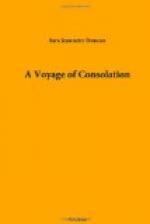But Mr. Pabbley had settled his hat in its normal position and did not intend to clear his brow for action again. All might have gone well, had it not been for the patriotic sensitiveness of Mr. Hinkson of Iowa.
“I think I heard you pass a remark about American newspapers, sir,” said Mr Hinkson of Iowa. “Think you’ve got any better in Canada?”
Mr. Pabbley smiled. There may have been some fancied superiority in the smile.
“I guess they suit us better,” he said.
“Got any circulation figures about you?”
“Not being an advertising agent, I don’t carry them.”
“I see!” Mr. Hinkson’s manner of saying he saw clearly implied that there might have been other reasons why Mr. Pabbley declined to produce those figures. We were all listening now, and the guide had subsided upon the box seat. The Senator’s face wore the judicial expression it always assumes when he has a difficulty in keeping himself out of the conversation. It became easier than ever to separate the Republican and the British elements on that coach.
“Well,” said Mr. Hinkson, “don’t you folks get pretty tired of paying Victoria taxes sometimes?”
The British contingent seemed to find this amusing. The Americans looked as if it were no laughing matter.
“I don’t believe Her Majesty is much the richer for all she gets out of us,” said Mr. Pabbley.
“Oh, I guess you send over a pretty good lump per annum, don’t you?”
“Not a red cent, sir,” said Mr. Pabbley decisively. “We run our own show.”
“What about that aristocrat that rules the country up at Ottawa?”
“Oh, he hasn’t got any say! We get him out and pay him a salary to save ourselves the trouble of electing a president. A presidential election’s bad for business, bad for politics, bad for morals.”
“You seem to know. Doesn’t it ever make you tired to hear yourselves called subjects? Don’t you ever want to be free and equal, like us? Trot out the truth now—the George Washington article!”
“Mister,” said Mr. Pabbley, “I flatter myself that Canadians are a good deal like United States folks already, and I don’t mind congratulating both our nations on the resemblance. But I’m bound to add that, while I would wish to imitate the American people in many ways still further, I wouldn’t be like you personally, no, not under any circumstances nor in any respect.”
At this moment it was necessary to dismount, and, as poppa and I both immediately became engaged in reconciling momma to the necessity of walking to the top of the plateau, I lost the rest of the conversation. Momma, when it was necessary to walk anywhere, always became pathetic and offered to stay behind alone. She declared on this occasion that she would be perfectly happy in the coach with the dear horses, and poppa had to resort to extreme measures. “Please yourself, Augusta,” he said. “Your lightest whim is law to me, and you know it. But I’m going to hate standing up in that photograph all alone with my only child, like any widower.”




